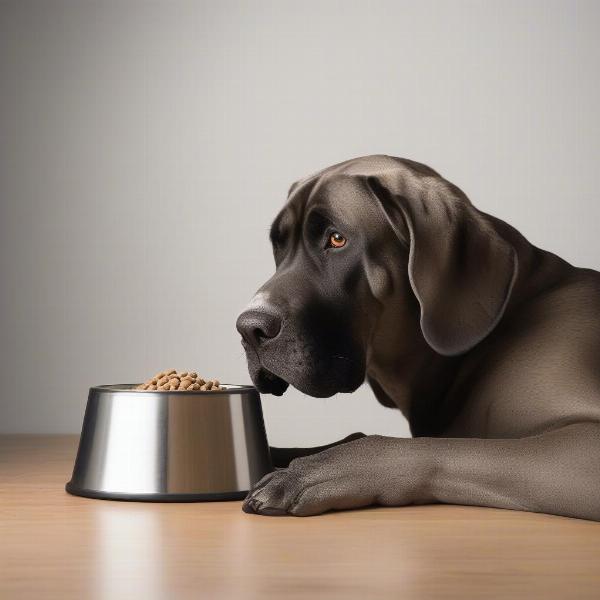Big dog pet food plays a vital role in the health and well-being of your large breed companion. Choosing the right nutrition is crucial for supporting their unique needs, from promoting healthy joints to maintaining a healthy weight. This guide will delve into the essential aspects of big dog pet food, providing you with the knowledge to make informed decisions that will keep your furry friend happy and thriving for years to come.
Understanding the Nutritional Needs of Large Breeds
Large breed dogs have specific dietary requirements that differ from their smaller counterparts. Their rapid growth during puppyhood puts a strain on their developing bones and joints, making appropriate nutrition essential for preventing skeletal problems later in life. A balanced diet rich in high-quality protein, controlled levels of calcium and phosphorus, and essential fatty acids is crucial for supporting their overall development and maintaining a healthy weight. Furthermore, certain large breeds are prone to specific health issues, such as bloat, hip dysplasia, and osteoarthritis, and choosing a diet tailored to address these concerns can significantly improve their quality of life.
 Big Dog Enjoying a Meal
Big Dog Enjoying a Meal
Choosing the Right Big Dog Pet Food
With a vast array of pet food options available, selecting the right one for your big dog can feel overwhelming. Look for foods specifically formulated for large breeds, indicated on the packaging. These formulas are typically lower in calories and fat to help maintain a healthy weight, and they often contain ingredients like glucosamine and chondroitin to support joint health. Pay close attention to the ingredient list, ensuring that the first few ingredients are high-quality protein sources, such as meat or fish. Avoid foods with fillers, artificial colors, and flavors, as these can contribute to digestive issues and other health problems.
Feeding Guidelines for Big Dogs
The amount of food your big dog needs will depend on factors such as their age, activity level, and overall health. Follow the feeding guidelines on the pet food packaging as a starting point, but be prepared to adjust the portion size based on your dog’s individual needs. Divide their daily food allowance into two or three meals to prevent bloat, a serious condition that can occur when large breeds eat too much food at once. Always provide fresh, clean water alongside their food.
Addressing Common Health Concerns Through Diet
Many large breeds are predisposed to certain health conditions, and their diet can play a crucial role in managing these concerns. For dogs prone to joint problems, consider a food enriched with glucosamine and chondroitin to support cartilage health. If your dog is overweight or obese, a low-calorie, high-fiber diet can help them shed those extra pounds. Consulting with your veterinarian is always recommended to determine the best dietary approach for your dog’s specific health needs.
Conclusion
Providing your big dog with the right nutrition is a cornerstone of responsible pet ownership. By understanding their unique needs and choosing a high-quality, appropriately formulated big dog pet food, you can help them live a long, healthy, and fulfilling life. Regular veterinary check-ups and a balanced diet are essential for keeping your gentle giant in top shape, both physically and mentally.
FAQ
-
What is the best type of protein for big dogs? High-quality animal proteins, such as chicken, beef, lamb, fish, and eggs, are excellent sources of essential amino acids for big dogs.
-
How much should I feed my large breed puppy? Follow the feeding guidelines on the puppy food packaging and consult with your veterinarian to ensure your puppy is receiving adequate nutrition for their rapid growth.
-
What are the signs of joint problems in large dogs? Limping, stiffness, difficulty getting up or down, and reluctance to exercise are all potential signs of joint issues.
-
Can I give my big dog human food? While some human foods are safe for dogs, many are toxic and should be avoided. Consult with your veterinarian before giving your dog any human food.
-
How often should I feed my big dog? Dividing their daily food allowance into two or three meals is recommended to prevent bloat and aid in digestion.
ILM Dog is a leading international online resource for dog owners worldwide. We offer expert advice on all aspects of dog care, from breed selection and puppy care to senior dog care and travel tips. Our team of experienced writers and veterinary professionals are dedicated to providing you with the most up-to-date and reliable information to help you give your furry friend the best possible care. For more helpful tips and resources, visit us at ILM Dog. Contact us at [email protected] or +44 20-3965-8624 for personalized support.